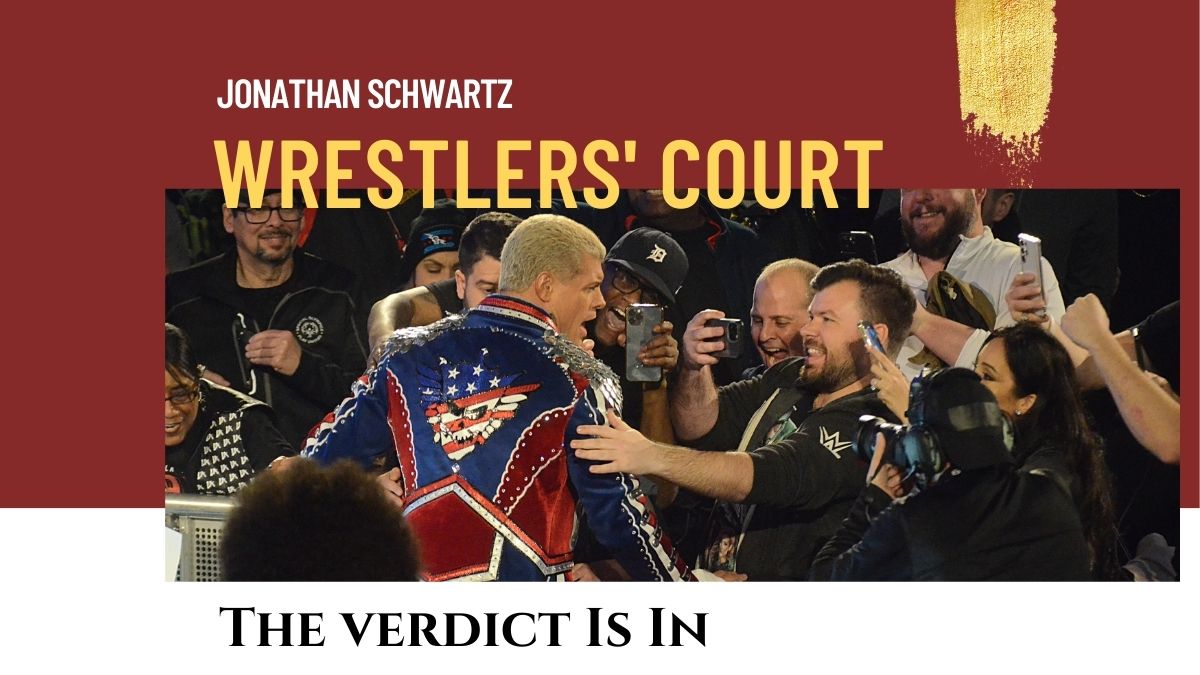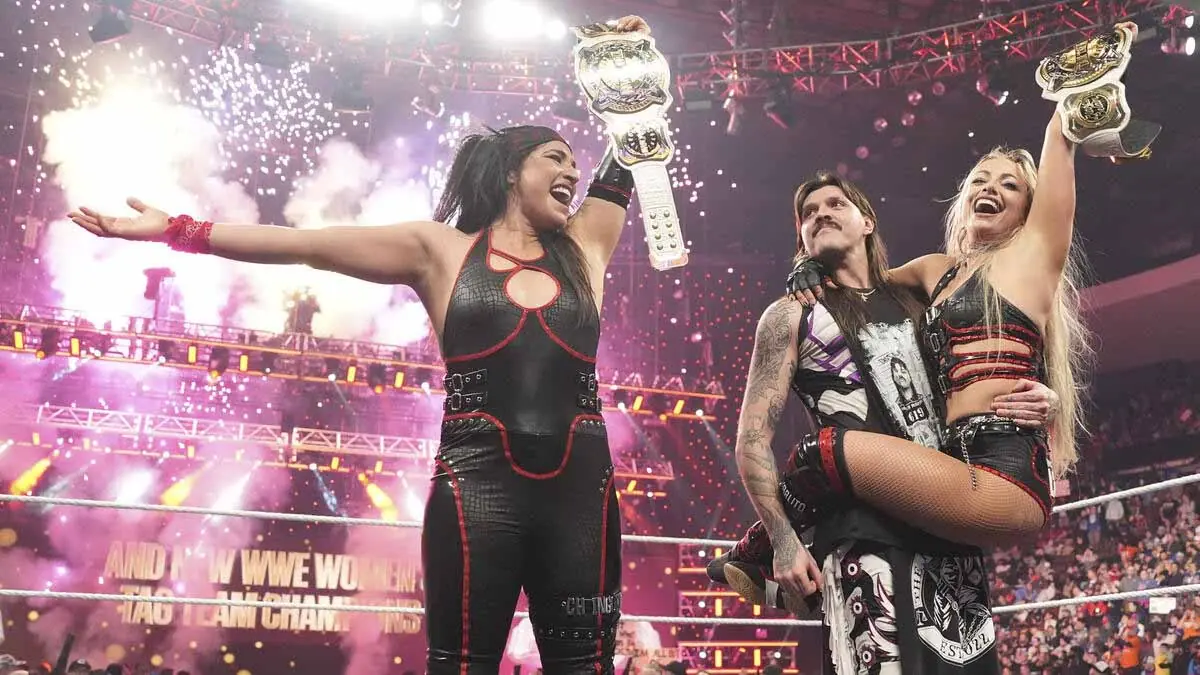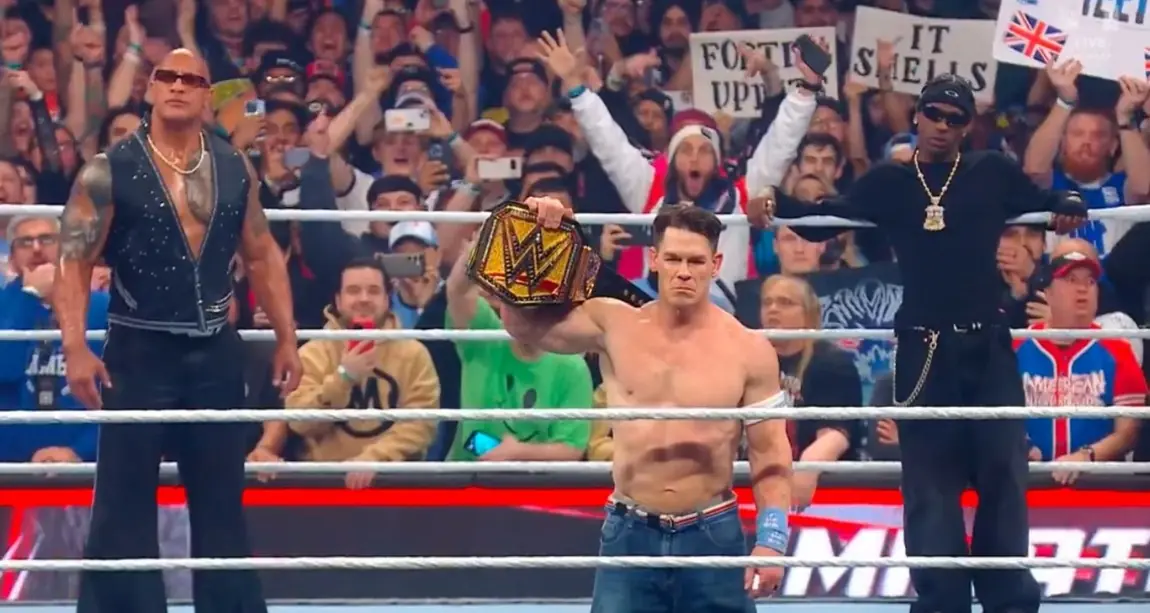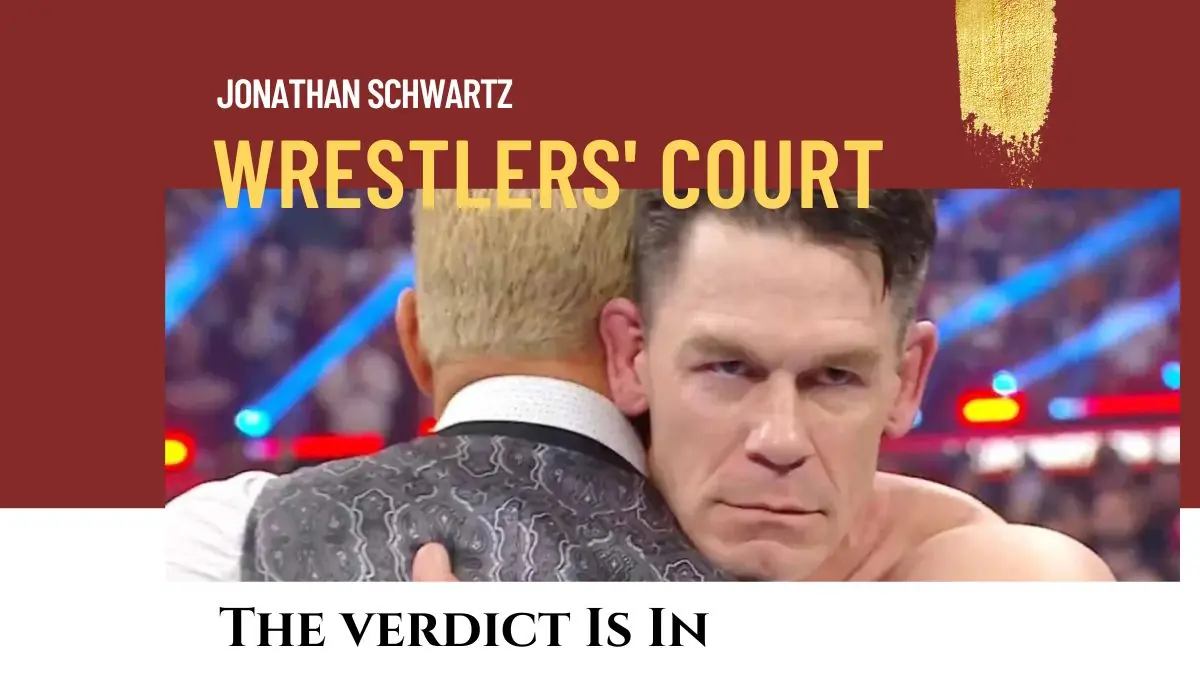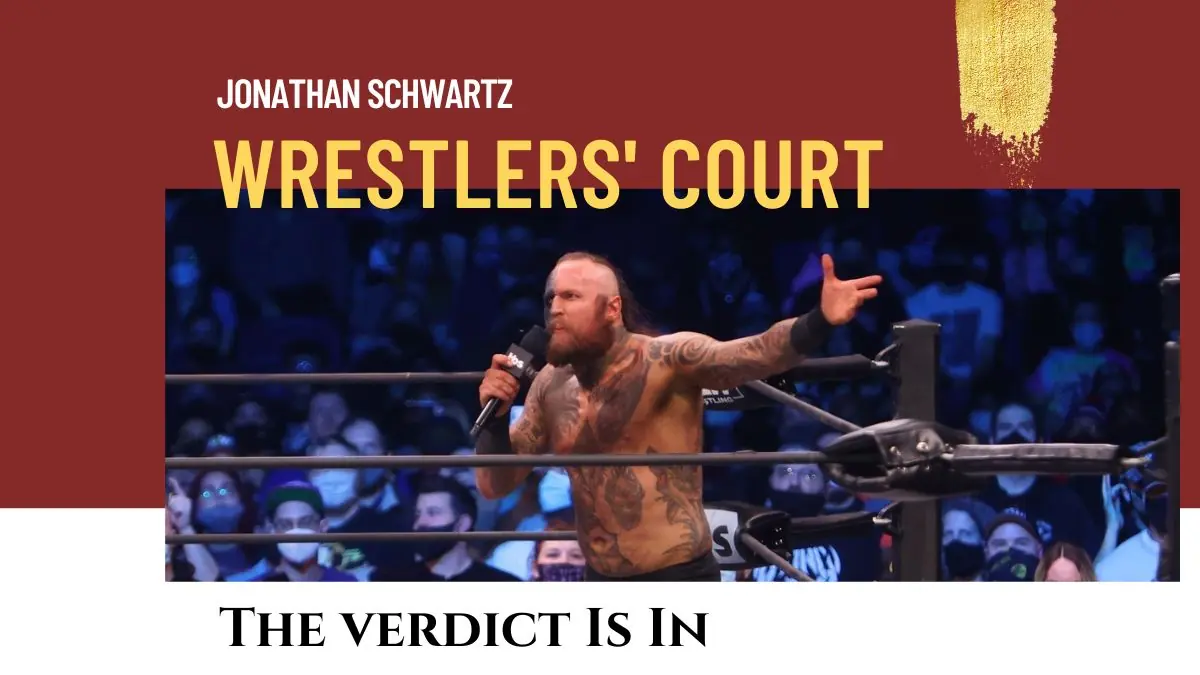A recent social media flurry suggests that current WWE Undisputed Champion Cody Rhodes should turn heel as soon as possible.
I think a heel turn is inevitable, as it is for pretty much every wrestler not named Rick Steamboat or Tito Santana, but the more fans call for it the more I think WWE needs to hold off and ultimately let the fans do the work of turning Cody themselves. In the meantime I think there’s another play — leaning into Cody’s natural heelishness and turning him into an anti-hero.
Here’s why.
Growing up, I was fascinated by professional wrestling and comic books. I see many parallels between the two. The bright colors and ornate costumes covering improbable physiques (natural and otherwise); the catchphrases and feats of strength and acrobatic attacks; the drawn-out storylines culminating in titanic battles between good and evil.
Wrestling insiders who can’t stand each other agree that the medium works best at its simplest: the struggle between hero and villain, where the hero triumphs in the end.
Within a match, spots as simple as a ‘no sell’ during a babyface’s comeback seem lifted from comic book pages. If pro wrestling is a physical form of serialized storytelling, what’s the difference between John Cena or Hulk Hogan walking through a barrage of punches versus bullets bouncing off Superman’s chest?

There’s a reason that Cena was derided by a segment of fandom as ‘Super’, or that when Roman Reigns took time away from wrestling for cancer treatment, the late Bray Wyatt Tweeted his support as Joker to Reigns’ Batman.
Cody Rhodes easily reads as a superhero. He sure looks the part, especially when clad in his red, white and blue American Nightmare gear. He couches his promos in the importance of family and regularly name-checks his legendary father, the late “American Dream” Dusty Rhodes. He’s blonde, muscular and taller than average at a billed 6-foot-2 but not so huge that he doesn’t look beatable. This is important: one of the challenges shared by superheroes and pro wrestling babyfaces is that they’re most sympathetic as underdogs. This demands ever bigger, more menacing threats for the hero to overcome. High-powered good guys like Superman or John Cena need true monsters to create a sense of danger that rallies fans to their sides. Rhodes telegraphs a bit more vulnerability — it comes through especially in his promos. He can get beaten down credibly then deliver a villain their comeuppance.
Rhodes has played heel before. He spent most of his first WWE run as a bad guy and never broke out of the mid-card. In fairness, he had few opportunities to display serious villainy as Randy Orton’s sidekick in the Legacy faction, as a preening narcissist under his “Dashing” gimmick or the psychologically-damaged “Undashing” version. I do think Rhodes makes a fine heel. He has gotten even the silliest gimmicks over, whether as outré as Stardust or as simple as a dude with a moustache.

Something about Rhodes’ current heroic presentation feels off to me. While he trades on his last name, he is up front about portraying a very different character from his father’s charismatic “everyman”. Rhodes retains some of the vanity underlying his previous heel personas. He wears suits to the ring and to a watch nerd like me, he has an admirable collection of Rolexes, two of which have so far worked their way into storylines. He uses polysyllabic words in promos — an old-time heel move that usually reads as arrogant and condescending. He dyes his hair blonde and literally wraps himself in the American flag with his custom gear and long flowing robes. He may be Dusty’s son, but his appearance owes way more to Dusty’s greatest rival, archetypal villain Ric Flair.
Rhodes’ ring robes and American Nightmare gear owe a debt to Homelander, the main antagonist in The Boys — first a comic book series and now a TV show airing on Amazon Prime. The Boys takes place in a world where superheroes exist but are mostly corrupt and dangerous. The comics focus on a CIA team whose job it is to oversee the “supes,” with increasingly grotesque, deadly consequences. In-universe Homelander is positioned as a superhero like Superman with powers including heat vision, super strength and speed, durability, and flight.
In recent interviews Cody has acknowledged that towards the end of his AEW run he was playing a Homelander version of himself: leaning into his natural heel charisma while working everyone into believing that he was the babyface (even, in character, himself). Rhodes seems to embrace the comparison now, going so far as to appear in an ad for the Amazon series, although I suggest that the Homelander comparisons fail on more than cosmetic grounds.
Homelander, you just met your American Nightmare! Watch all new episodes of The Boys streaming now on Prime Video. #ad@TheBoysTV@PrimeVideopic.twitter.com/H0undFNrqw
— Cody Rhodes (@CodyRhodes) July 2, 2024
Cody works best as a sympathetic figure. Homelander is an unmitigated villain in a fictional universe that lacks any moral compass. As part of a press tour hyping the latest season of The Boys, showrunner Eric Kripke has been clear that he regards Homelander as an alt-right villain in the mold of a certain former President. Homelander is utterly without conscience. His powers give rise to an unfettered sense of entitlement where his might makes right. Per Wikipedia, “He is also highly self-righteous, delusional, possessive, paranoid, vindictive, insecure, insensitive, hypocritical, reckless with his powers, and incapable of accepting the possibility of any flaw in his person or decision-making.”
Cody has spoken directly to the growing demand for a heel turn. In a July 3 interview with The Pivot Podcast he stated:
It is very hard to be a heel today. Very hard because what is a heel? If a heel is trying to actively take something away that you like…
You’ll hear people in wrestling say “There’s a wrong type of heat”, there’s truly no such thing as long as you can manage it. Today people get cancelled for everything, every hour someone’s getting cancelled and uncancelled. A heel’s job is to get cancelled. A heel’s job is to not be cool, to not sell merch, and I think in wrestling the term has gotten more identified with The Rock types, that aren’t really heels….
There’s a beauty if you can commit to being a bad guy, it’s a unique space creatively, you need to be vulnerable and open, and you’ve got to be blood-hungry in terms of how you are on the microphone, there’s a growing section of fans that wants to see that happen for me at some point.
I understand the links, but I don’t really know if they know what they’re asking for though. If you’re really wishing for that, it’s scorched earth. And then you might be like “ah I don’t like that, no, that’s rude to that group of people”, no that’s the job.
Someone’s going to come out and beat me up in a minute, before they do, I’m going to talk my trash. You have to really go scorched earth in this day and in 2024 it’s hard.
I suggest that what fans ultimately want is less an actual villain and more an anti-hero.
An anti-hero is the main character of a work of fiction who lacks traditional heroic qualities. Traditional heroes are generally idealistic, courageous and moral to a fault. An anti-hero may do the ‘right’ thing, often for the ‘wrong’ reason. The anti-hero is an outcast who is not trusted by his moral ‘superiors’. Most importantly, an anti-hero joins the conflict at the center of the story for his own reasons. Superman fights for “Truth, Justice and the American Way.” Batman fights crime out of his insatiable need for vengeance. The Punisher is similarly motivated. Lobo collects bounties. Deadpool kills because he feels like it.
Anti-heroes have always had a place in fiction. Shakespeare featured them: Shylock, Hamlet, Othello and Lady Macbeth all meet the criteria. Satan in Milton’s Paradise Lost can be read as a sympathetic villain or anti-hero depending on your own beliefs. Dostoyevsky’s Raskolnikov, Twain’s Huckleberry Finn, and Fitzgerald’s Jay Gatsby too. Pop culture characters like James Bond and Tom Ripley and Michael Corleone and the Vampire Lestat are morally ambiguous and blatantly self-interested. Historical properties like Sherlock Holmes or Dracula are often rejigged as anti-heroes for modern audiences along with recent characters like Dr. Hannibal Lecter, Tyler Durden, Dexter Morgan and Shrek.

Within the world of comic books anti-heroes have taken over. Depending on who holds the pen, DC’s Batman, Catwoman, the Joker and Harley Quinn have all been played as anti-heroes. John Cena has gotten into the act with his NSFW take on the Peacemaker. Marvel’s anti-heroes pre-date the company, like the anti-social Submariner. He has been joined by characters including the Hulk, Iron Man, Magneto, Juggernaut, Ghost Rider, Blade, the Punisher, Venom, Moon Knight and heading to a theatre near you, Wolverine and Deadpool (I’ll get back to him).
Professional wrestling has its own anti-heroic tradition. Within its inherently violent approach to storytelling anti-heroes are necessary and more compelling than traditional babyfaces. An ‘aw shucks’ goody-two-shoes like Bruno Sammartino or Bob Backlund can grow stale. Unlike comic books where fantasy is bound by panels on a page, wrestling makes a winking claim to reality. Past a point, the continued betrayals and beatings and stolen victories in this violent theatre-in-the-round demand an angry response. An eternally optimistic babyface eventually just comes across as stupid. That may be why many fans start cheering for the heels.

Smart promoters recognize fans’ love for anti-heroes and try to leverage it by turning popular villains ‘good’ while retaining their flawed nature. Old-school characters as varied as Lou Thesz, Buddy Rogers and Johnny Valentine all played the part. Wrestlers like Dick the Bruiser and Da Crusher aged into anti-hero status, starting as barnstorming, fearsome villains and settling into anti-hero status as they grew older and put down roots in a narrower range of territories. I guess to know them was to love them. Mad Dog Vachon, Pat Patterson and Gene Kiniski did the same with the added wrinkle of trading on their status as Canadians who succeeded abroad. I think Bret Hart’s latter run qualifies as well. As the anti-American leader of the reconstituted Hart Foundation he was reviled in the US but loved by everyone everywhere else except Bill Goldberg. Also, Rowdy Roddy Piper, Jake The Snake Roberts, The Undertaker, Stone Cold Steve Austin and The Rock come to mind.
John Cena’s emergence from his rap persona to “Hustle, Loyalty, Respect” marked a transition from villain to anti-hero to full hero. Hulk Hogan’s 1980s run set him up as a true hero, but sharp observers would note how Hogan acted like a heel even at the height of his popularity: the endlessly loud and bragging promos and reduced, brawling move set was more bad guy than good. Hogan became a real anti-hero when he joined the New World Order in WCW and helped usher in the cool heel trope.
The same goes for Roman Reigns, who was rejected by fans for years as a world beating good guy pushed by Vince McMahon, but who has slowly gained fans’ appreciation over the last few years of his heel run. Whenever Roman Reigns comes back and surveys the damage wrought by Solo Sikoa to the Bloodline, he will fall into the anti-hero category as well, to a massive crowd pop.

Within recent memory, Jey Uso, Kevin Owens, LA Knight and Randy Orton have all played the role — especially when their face turns are greeted with skepticism by the locker room. Rhea Ripley will likely do the same when she returns, and it will make her a bigger star than she already is.
AEW likely has the best anti-hero in the business in MJF (or did, until they turned him back heel on the most recent episode of Dynamite). MJF may just be the Deadpool of pro wrestling: he consistently speaks directly to the audience and lays bare the conventions of booking. He openly cheats in matches while playing to the crowd and spent most of his face run as “your scumbag”. Deadpool may be the ultimate comic book anti-hero and best allegory for pro wrestling; he is not only flawed within the bounds of a given story, he turns heel on comicdom in general by repeatedly breaking the fourth wall, acknowledging his status as a fictional character and addressing the reader directly.
In the quote above, Cody acknowledges just how far he would have to take a heel persona to make it work. I don’t think audiences want to see that. Better for Cody to develop more of an edge to his existing persona, growing more cynical as he fends off a series of challengers. What Rhodes needs more than a heel turn is his own Rogues’ Gallery of heels: villains who put him to the test in a series of programs in a variety of ways.
Let’s hear it for the anti-hero.
TOP PHOTO: Cody Rhodes in dark match after Smackdown went off the air at the Little Caesars Arena in Detroit, Michigan, on Friday, April 12, 2024. Photo by Brad McFarlin
RELATED LINKS
